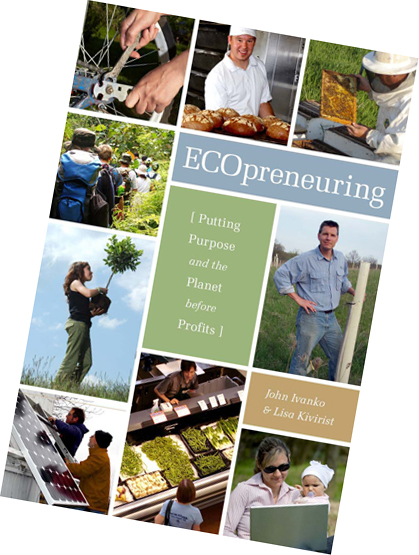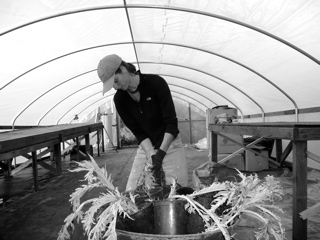Groundswell Farm |  |
Groundswell Farm |  |
Groundswell Farm: Growing a business rooted in the land
"My connection to this land runs so deep I think it's embedded in my DNA," Zoë Bradbury says with a smile. Raised on this same 80-acre farm in Langlois, Oregon, five miles from the ocean and nestled in the lush Floras Creek valley, Bradbury grew up birthing lambs in the spring, watching salmon spawn in the fall and foraging fruits and berries in season with her family. Today, twenty-eight-year-old Bradbury exemplifies the fresh crop of young farmers increasing in number nationwide, working to change our industrialized food system, one row of organic potatoes at a time.
"There are so many myths about farming today, especially for young people starting farms," notes Bradbury. "People think you farm because you're not smart enough to do anything else. In reality, farming is one of the most complex, intellectually stimulating and challenging pursuits I've ever engaged in. Right now I'm doing everything from learning accounting and setting up my financial records to becoming a soil scientist as I figure out the fertility needs of the land. I have stacks of books on everything from farming with draft horses to QuickBooks manuals, even a how-to publication for beginner welders," Bradbury adds with a grin.
Fledgling farmers like Bradbury, dedicated to stewarding the land and raising healthy food, quickly realize there are no rulebooks for small-scale farm start-ups today. "I don't fit in the traditional agricultural box. Rather than play by the large-scale model of conventional farming, I want to rewrite these rules, using my business to yield more than just food. I want Groundswell Farm to improve soil quality, help grow a more locally-based food system and bring more healthy, fresh food choices to my community."
Bradbury landed back on her southern Oregon coast family farm after a decade of learning experiences, ranging from a masters degree in food systems, managing a larger organic farm and working for various sustainable agriculture non-profits. "All these experiences proved invaluable to me and confirmed for me that I truly wanted to farm," Bradbury explains. "While I loved the non-profit mission, working at a desk all day wasn't for me. And working for other farms gave me the opportunity to experiment with farming risk-free. I feel like I've done my homework and now know that I'm ready to make the leap into running my own farm."
2008 marks Bradbury's first official independent season farming, but she's not doing this alone. Bradbury joins her sister, Abby Bradbury, and mother, Betsy Harrison, in a trio-partnership of farming enterprises that provide support to each other. "While we each run our own individual business and keep separate accounts, we market collectively," explains Bradbury. "Our clients and customers like this because they place one order and receive one invoice. My family and I help strengthen each other's businesses through practical measures like transporting our products together and sharing capital expenditures such as keeping up the greenhouses. But it's the day-to-day emotional support of us being together that make this both realistic and rewarding for all of us."
Bradbury will grow a diversified roster of produce to compliment what her sister and mom are already growing. "I made my decision on what to grow based on what does well in our climate, what will sell well in the local market and, importantly, what I like to eat," Bradbury continues. Bradbury took her market research seriously, tapping into interest among restaurant chefs in the nearby seaside tourist town of Bandon looking for locally sourced seasonal products. "I interviewed area chefs and asked them what they were looking to buy. Right now there's aren't many vegetable growers in our area, so the buyers I talked to were yearning for just about any locally-grown, fresh produce items, which helps support my goal of keeping the farm diversified." From perennial row crops such as raspberries, strawberries, asparagus and artichokes to annual crops like carrots, beets and fennel, Bradbury is growing a wide range of crops this season.
Bradbury's efforts strategically compliment the business ventures her family already has going. For over a decade, Bradbury's sister has successfully nurtured a salad greens enterprise that now has a loyal local following. "My mom's business first sparked when she saw an opportunity to use Abby's greenhouses during the summer when Abby moved her greens operation outside," Bradbury narrates. Bradbury's mom specializes in raising Mediterranean produce in the greenhouse, growing things like tomatoes, basil and eggplant that don't do that well outdoors due to the cooler growing climate of costal Oregon.
As with any new business upstart, Bradbury realizes farming also offers its fair share of challenges. "Timing is key on the farm, yet so much of it is out of my control -- from the weather to when exactly my supplies will deliver our thirteen and a half tons of soil amendments," advises Bradbury. "I'm learning not to stress over things I can't control to stay focused on the bigger picture, and to enjoy every moment that I'm in."
Like other ecopreneurs launching businesses in other industries, Bradbury shares concern over cash flow. Farming magnifies cash flow issues because much of the investments and related costs for farming come early in the growing season before income starts coming in from harvest sales. Unfortunately, small scale, diversified organic growers like Groundswell Farm often fall out of the box of potential assistance from federal entities like the Farm Service Agency. "I'm not their typical customer looking for a loan," explains Bradbury, recounting how her efforts to get a federally financed low-interest loan backfired because farm loans are based on standard commodity pricing. "I know the area chefs would gladly pay me ten times what the Farm Service Agency had on record for the state commodity price for asparagus. I didn't fit into the conventional box." Leery of debt, Bradbury is looking into zero-interest credit cards for the first year to aid with cash flow.
Bradbury's farm experiences to date offer sound advice for ecopreneurs in other industries:
Beyond supplies, Bradbury also understands investing in the future means making business choices that reduces her operation's dependency on oil. "I recently purchased a team of draft horses so I could farm without being reliant on diesel fuel, aiming to create a closed loop farm system where I'm not dependent on outside energy." Adding the composted horse manure to the soil will also enhance soil nutrients.
"My mom always says that everything we do should be fifty-one percent art," sums up Bradbury. "The creative inherent in both writing and farming keeps this life of mine rich and fulfilling. Whether I'm building a horse shed or planting artichokes, I see everything I do as an interconnected act of both function and beauty. I may be physically tired at the end of the day, but I am satisfied to the bone thanks to this farm."
Resources:
- Land Stewardship Project's Farm Beginnings program
- Women in Food & Agriculture Network
- Bradbury's Groundswell Farm blog
- Food and Society Policy Fellows
- Renewing the Countryside, offering hundreds of success stories of sustainable farmers and rural ecopreneurs nationwide.
| ECOpreneuring Book Order Information Order your copy of ECOpreneuring today at a 22% discount off list price (a PDF file order form). |
ECOpreneuring blog | Speaking | In the News Resources | Share your Story | Homepage | W7843 County P Browntown WI 53522 E-mail: info@innserendipity.com www.ecopreneuring.biz |